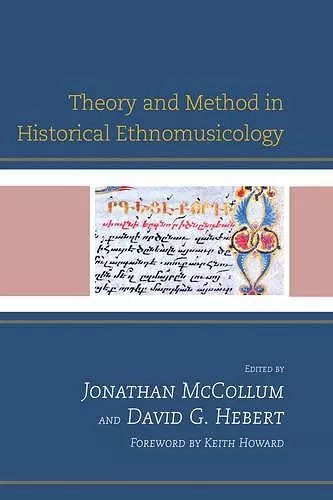Theory and Method in Historical Ethnomusicology
Jonathan McCollum editor David G Hebert editor
Format:Hardback
Publisher:Lexington Books
Published:11th Sep '14
Currently unavailable, and unfortunately no date known when it will be back
This hardback is available in another edition too:
- Paperback£58.00(9781498500869)

Historical ethnomusicology is increasingly acknowledged as a significant emerging subfield of ethnomusicology due to the fact that historical research requires a different set of theories and methods than studies of contemporary practices and many historiographic techniques are rapidly transforming as a result of new technologies. In 2005, Bruno Nettl observed that “the term ‘historical ethnomusicology’ has begun to appear in programs of conferences and in publications” (Nettl 2005, 274), and as recently as 2012 scholars similarly noted “an increasing concern with the writing of musical histories in ethnomusicology” (Ruskin and Rice 2012, 318). Relevant positions recently advanced by other authors include that historical musicologists are “all ethnomusicologists now” and that “all ethnomusicology is historical” (Stobart, 2008), yet we sense that such arguments—while useful, and theoretically correct—may ultimately distract from careful consideration of the kinds of contemporary theories and rigorous methods uniquely suited to historical inquiry in the field of music. In Theory and Method in Historical Ethnomusicology, editors Jonathan McCollum and David Hebert, along with contributors Judah Cohen, Chris Goertzen, Keith Howard, Ann Lucas, Daniel Neuman, and Diane Thram systematically demonstrate various ways that new approaches to historiography––and the related application of new technologies––impact the work of ethnomusicologists who seek to meaningfully represent music traditions across barriers of both time and space. Contributors specializing in historical musics of Armenia, Iran, India, Japan, southern Africa, American Jews, and southern fiddling traditions of the United States describe the opening of new theoretical approaches and methodologies for research on global music history. In the Foreword, Keith Howard offers his perspective on historical ethnomusicology and the importance of reconsidering theories and methods applicable to this field for the enhancement of musical understandings in the present and future.
By means of thoughtful commentary on potential sources and procedures, the editors and authors of new articles will hopefully stimulate burgeoning interest in historical perspectives on the part of ethnomusicologists. -- Bonnie C. Wade, University of California, Berkeley
A timely, thoughtful, and engaging collection, Theory and Method in Historical Ethnomusicology is sure to become an important resource. McCollum, Herbert, and their collaborators have done a great service to musical scholars of all stripes, be they historical musicologists, ethnomusicologists, or somewhere in between. -- Ken Prouty, Michigan State University
This book is an ardent call for a historical turn in ethnomusicology. -- Alexandra Kertz-Welzel, Ludwig Maximilian University
A scholarly and incisive account of the place of historiography in ethnomusicology. Editors McCollum and Hebert adopt an organizational structure that achieves a fine balance between historical, philosophical, and theoretical foundations, and their application is illustrated brilliantly in studies of diverse global music traditions. The text transcends music disciplinary boundaries and points the way to an expanded vision for historiography in music scholarship. -- Marie McCarthy, University of Michigan
ISBN: 9780739168264
Dimensions: 232mm x 163mm x 37mm
Weight: 762g
430 pages